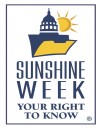 In honor of National Sunshine Week, take a few minutes to read this op/ed piece by Missouri Press Association Executive Director, Doug Crews, about what’s happening in Missouri with The Sunshine Law. National Sunshine Week is observed this year from March 10-16.
In honor of National Sunshine Week, take a few minutes to read this op/ed piece by Missouri Press Association Executive Director, Doug Crews, about what’s happening in Missouri with The Sunshine Law. National Sunshine Week is observed this year from March 10-16.
Take a look out your front door.
Is the sun shining at your city hall? Is it shining at your county
courthouse and at your public fire district headquarters?
How bright is the sun shining at the school board’s headquarters, at your
public water district office and in your public hospital board’s meeting
room?
March 10-16 is set aside for National Sunshine Week in Missouri and across
the U.S.
This week-long observance is a time for citizens and taxpayers to focus on
state and local government operations and how those operations are visible
to the citizens and taxpayers they serve.
Since 1973, the State of Missouri has had a Sunshine Law in its statutes.
Forty years ago, the Missouri Legislature passed Senate Bill 1, and
then-Governor Christopher S. Bond signed it into law.
The Sunshine Law, located in Chapter 610 of Missouri’s revised statutes,
sets out the rules for public governmental bodies — such as city councils,
county commissions and boards of education — to follow in providing access
to their public meetings and public records.
A key passage in Missouri’s law says, "It is the public policy of this state
that meetings, records, votes, actions, and deliberations of public
governmental bodies be open to the public unless otherwise provided by law."
And, sections of the Sunshine Law "shall be liberally construed and their
exceptions strictly construed to promote this public policy."
This year in Jefferson City, bills are moving through the General Assembly
to amend the Sunshine Law with changes that will strengthen the law for
citizens. The Missouri Press Association is supporting these bills and has
testified in favor of current versions. Testimony supporting the bills has
been given by the Missouri School Boards Association, also.
Dissenting testimony has come primarily from the Missouri Municipal League,
the St. Louis County Municipal League and the Missouri Association of
Counties.
The bills would make more than a dozen changes to the current Sunshine Law,
among them:
— Two exemptions to the Sunshine Law expired on Dec. 31, 2012. These
exemptions, enacted soon after the 9/11 attacks of 2001, protect operational
guidelines, security plans and systems of public facilities, such as
schools, and the bills would reinstate the two exemptions.
— The fine for a violation of the law would be $100. (The current fine for
a "knowing" violation of the law ranges up to $1,000.) And, if found guilty
by a judge, the public governmental body would be required to pay court
costs and fees of the plaintiff who filed the lawsuit.
— City councils, county commissions, school boards and other local public
bodies would be required to provide 48-hours’ notice of their meetings.
Currently, 24-hours’ notice is required.
— Interested members of the public who desire to receive notices of
meetings could request such notices from public governmental bodies.
— Minutes of a closed meeting would contain a list of subjects discussed
during the closed meeting to help avoid discussions straying from the
original purpose of the closed meeting.
— Missouri is the only state in the nation whose National Guard has a
complete, blanket exemption to its state Sunshine Law. It’s odd that the
federal Freedom of Information Act applies to the Missouri National Guard,
but the Missouri Sunshine Law doesn’t apply to the taxpayer-funded National
Guard. One of the proposals in Jefferson City would eliminate the Guard’s
exemption.
Senate Bill 139; House Bill 256, 33 & 305; and House Bill 600 contain more
bright sunlight shining on government, and less darkness.
Two of the Sunshine bills have passed by wide margins in the Missouri Senate
and the Missouri House of Representatives, respectively, but they have not
reached the finish line and the Governor’s desk. House Bill 600 awaits
consideration in committee.
Key supporters of Sunshine legislation include Sen. Kurt Schaefer
(R-Columbia), Sen. Mike Kehoe (R-Jefferson City), Speaker of the House Tim
Jones (R-Eureka), Rep. Caleb Jones (R-California), Rep. Todd Richardson
(R-Poplar Bluff), Rep. Nate Walker (R-Kirksville), Rep. Casey Guernsey
(R-Bethany), Rep. Chris Kelly (D-Columbia), and a host of bill co-sponsors.
If you are interested in a more transparent, open government, the Missouri
Press Association urges you to contact State Senators and State
Representatives to seek their support in strengthening the Missouri Sunshine
Law . . . this year! Ask them to vote for government in the sunshine!
Two years after Missouri legislators passed Senate Bill 1, the late Judge
Fred L. Henley of the Missouri Supreme Court in a 1975 decision, Cohen v.
Poelker, speaking for the majority in that case, said, "The several sections
of Chapter 610, considered together, speak loudly and clearly for
the General Assembly that its intent in enacting the Sunshine Law, so
called, was that all meetings of members of public governmental bodies …
at which the people’s business is considered must be open to the people and
not conducted in secrecy, and also that the records of the body and the
votes of its members must be open."
It’s "the people’s business!" Thank you, Judge Henley!
Happy Sunshine Week!


